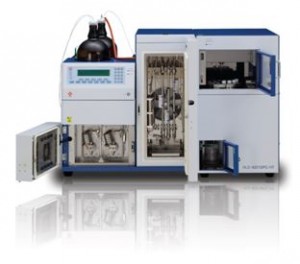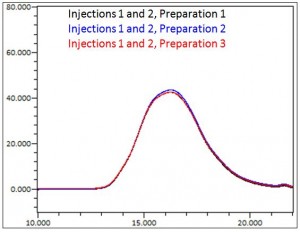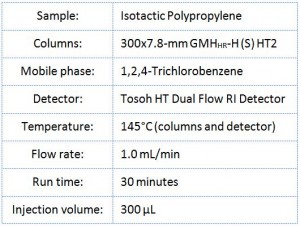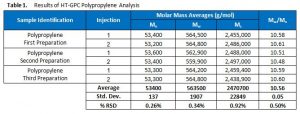Polypropylene is one of the most highly produced polymers in the world. The versatility of this polymer is the reason it can be found in almost every major plastics market including the packaging, textile, automotive, building, aerospace, and medical industries. Polypropylene has the unique ability to adapt to a variety of fabrication and manufacturing techniques, and happens to be one of the most recycled plastic products in the world. Some of the physical properties and characteristics of this “super-plastic” that contribute to its increasing popularity are:
- Strong chemical resistance
- Low conductivity
- Strength
- Toughness(deformation without breaking)
- Fatigue resistance
- Moisture resistance
- Melt Viscosity
The molecular weight characterization of polypropylene is a critical data parameter that directly relates to its performance in end-use applications as well as the industrial grade, quality, and reliability of raw materials. Gel permeation chromatography (GPC) is a common technique for analyzing the molecular weight distribution of polymers. The physical properties that enable the versatility and wide range of uses for polypropylene are the same characteristics that create difficulties in the molecular weight analysis of a sample. The high degree of crystallinity and chemical resistance typical of polypropylene requires specialty solvent systems and elevated temperatures to allow dissolution of the material. The analysis requires continuous, constant high temperatures from the pumps and autosampler to the waste reservoir to avoid recrystallization of the sample.

Our Tosoh EcoSEC High Temperature GPC system not only allows for analysis of polypropylene, it does so with remarkable precision and reliability. The system is equipped with a dual flow refractive index (RI) detector,
delivering unparalleled baseline stability and reproducibility throughout changes in solvents, samples, temperatures, and pressures. Polymer Solutions maintains several registrations and accreditations including ISO/IEC 17025, cGMP compliance, and FDA Registration. Our accreditations, passion for science, and state-of-the-art HT-GPC afford us the unique opportunity to provide our clients with highly accurate molecular weight analysis of polypropylene.


The highly precise and reproducible results for the molar mass analysis of polypropylene samples are shown in the figure below. Duplicate injections from three separate sample preparations are displayed in the chromatogram overlay. The calibration curve for molar mass calculations was generated using 12 polystyrene standards ranging from 162 to 6,035,000 g/mol. The molar mass averages (Mn, Mw, and Mz) and polydispersity (Mw/Mn) for the six injections are given in Table 1, as well as the relative standard deviations (%RSD) of <1% for each calculated value.

This post was contributed by one of our brilliant chromatography scientists, Michael Rea.
